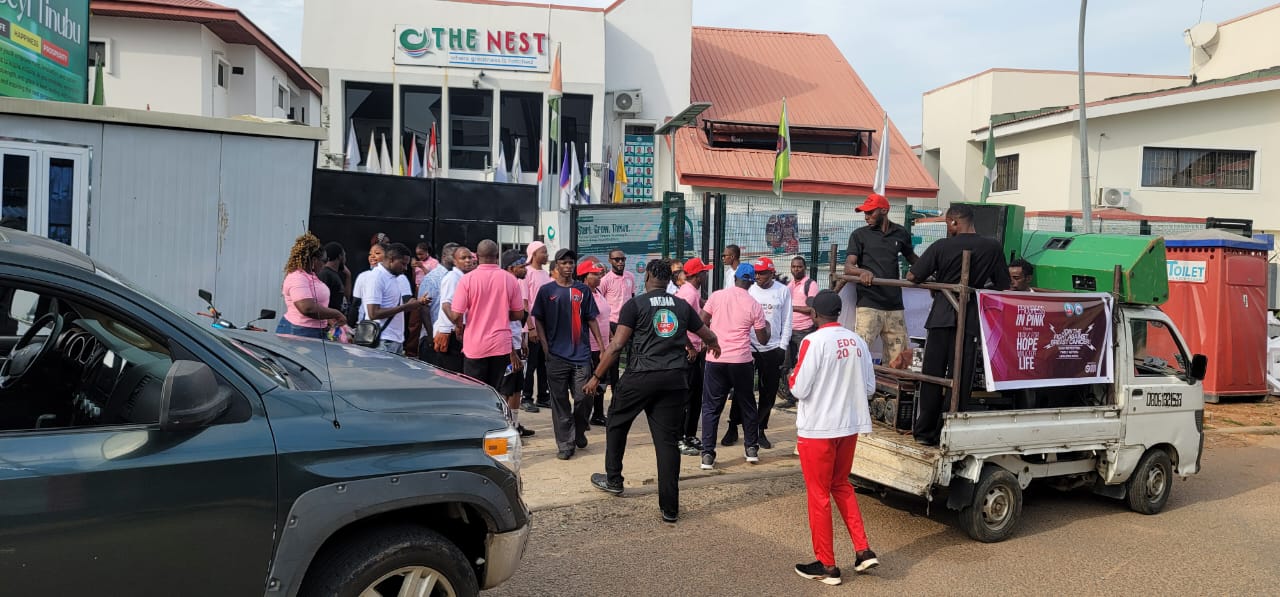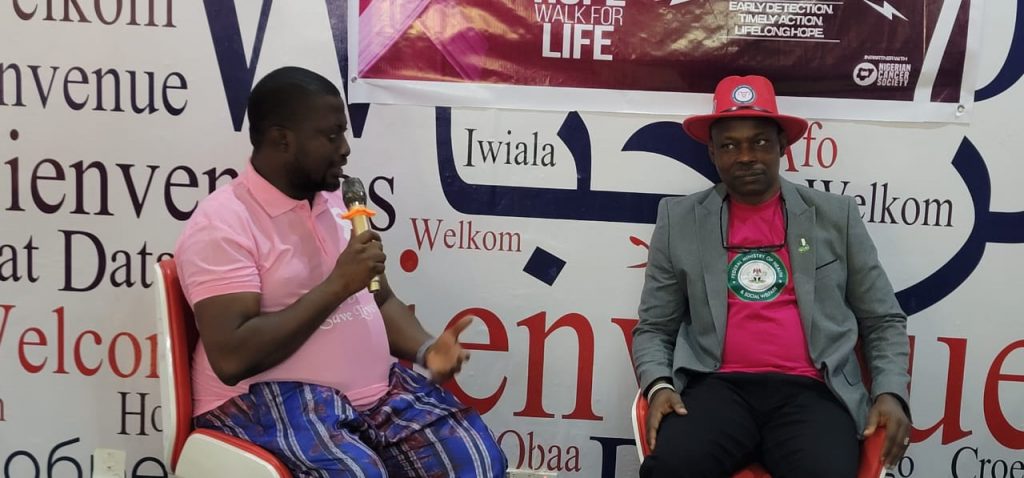Health
What Menstrual Health Means to Nigerian Girls from Low-Income Families in 2024
By Margaret Aladeselu, Nguvu Collective Change Leader
Period poverty affects many girls and women from low-income families in Nigeria. While economic challenges often take precedence over social issues, the silent struggle of period poverty remains largely unacknowledged. In fact, many people are not even aware of what period poverty is. Simply put, it refers to the inability of menstruators to afford sanitary products, which impedes their ability to manage their menstrual health with dignity and ease.
Period poverty affects millions of girls and women in Nigeria, particularly those from low-income and marginalised communities. In 2022, recognising the need for change, I took the initiative to launch a petition and lead a campaign on menstrual hygiene in Nigeria, urging tax exemption on sanitary products and access to indispensable menstrual hygiene provisions for every woman, with the aim of finding sustainable solutions for countless young women in Nigeria, who experience inadequate access to essential menstrual hygiene resources due to financial constraints. The potential impact of this campaign is significant: it would not only alleviate the financial burden on menstruators but also foster greater accessibility to sanitary pads and tampons for young girls and women across the nation.
The recent economic downturn has significantly worsened the alarming situation of individuals living in poverty. The rising costs of living, coupled with the depreciation of currency values, have rendered basic necessities, such as sanitary pads, increasingly unaffordable for many, resulting in a sharp increase in period poverty. As a result, the number of girls who can no longer afford sanitary products has likely doubled, making menstrual hygiene a luxury that many low-income families can no longer afford.
To address this issue, I co-founded Period Padi, an NGO dedicated to ending period poverty one girl at a time, and we organised an outreach program to provide free menstrual products to school girls from low-income families. Our goal is to reach at least 1,000 girls by the end of the year. During our first outreach program, we had the opportunity to speak with some of the girls and understand their perspectives on menstrual health. Unfortunately, their responses were not encouraging. Many of them expressed a sense of resignation, with some admitting to using rags or toilet paper in the absence of sanitary pads. The free pads we provided, although in small quantities, were a huge relief for them.
However, addressing period poverty goes beyond simply distributing free pads; it depends on policymakers taking action to prioritise the well-being of menstruators and removing taxes on sanitary products. Unfortunately, many people don’t realise how big of an issue this is for millions of girls in Nigeria. But for me, it’s personal. I see these girls struggling every day, with their families barely able to afford food, let alone menstrual products. It’s time we all recognise the urgency of this problem and work together to find solutions.
As we reflect on World Menstrual Health Day, let us not only acknowledge the stark realities of period poverty but also commit to concerted action. By prioritising menstrual health as a fundamental human right, we can catalyse transformative change and pave the way for a more equitable and dignified future for all Nigerian girls and women.
Health
APC Youth Leader, Health Minister, Others Champion “Going Pink Walk” for Breast Cancer Awareness in Abuja


Joel Ajayi
It was a vibrant gathering of energetic young men and women across the Federal Capital Territory (FCT) on Saturday in Abuja, as they joined the “Progress in Pink Walk”, a non-competitive awareness march organized by the All-Progressives Congress (APC) Youth Wing to mark Breast Cancer Awareness Month.
The event, themed “Walk for Hope, Walk for Life,” was commenced at The Nest — A Place Where Greatness is Hatched, an over 4 kilometres walk aimed at encouraging early detection, promoting timely medical intervention, and offering hope to those affected by breast cancer.
Leading the walk was the APC National Youth Leader, Dr. Dayo Israel, who has remained consistent in championing initiatives that promote youth empowerment, health consciousness, and community impact.
Over the years, Israel has spearheaded several programs designed to enhance the capacity and wellbeing of young Nigerians.
Globally, October is recognized as Breast Cancer Awareness Month — a period dedicated to increasing awareness, encouraging prevention, and supporting those battling the disease. The APC Youth Wing’s initiative aligns with this global campaign, demonstrating the party’s ongoing commitment to public health advocacy and youth-driven change.
Speaking after the walk, an elated Dr. Dayo Israel explained that the initiative was organized to create awareness among women, both young and old, on the importance of knowing their bodies and seeking medical attention early.
“We want women to know their breasts so well that if anything unusual happens, they act quickly.
“Cancer doesn’t occur overnight it develops over time. awareness, and early detection are key to saving lives,” he said.
He added that the walk also sought to promote fitness as a vital component of a healthy lifestyle and to encourage women to adopt positive habits that support their wellbeing and happiness.
In his remarks, the Minister of State for Health and Social Welfare, Dr. Iziaq Adekunle Salako commended the APC Youth Wing for taking proactive steps to raise awareness about a critical health concern.
“With this step you have taken today, more Nigerians will become aware of the dangers of late detection.
“Unfortunately, eight to nine out of ten breast cancer cases in Nigeria are detected late — a situation we must change through constant awareness and screening,” he said.
He emphasized the importance of prevention, urging Nigerians to take their health seriously through regular check-ups, healthy living, and avoidance of risk factors like smoking.
Also speaking, the President and CEO of the Nigerian Cancer Society, Prof. Abidemi Omonisi, noted that breast cancer remains one of the most prevalent forms of cancer in Nigeria, accounting for up to 40–50% of all cancer cases.
“Breast cancer remains a major public health challenge. Exercise plays a vital role not only in prevention but also in improving outcomes for people living with cancer and other non-communicable diseases such as diabetes and hypertension,” he said.
Prof. Omonisi stressed the need for a community-based response to cancer similar to the national efforts used to combat HIV/AIDS.
“We must involve everyone from schools and youth groups to community organizations to build resilience and eliminate the fear and stigma surrounding cancer,” he added.
He praised the APC Youth Wing for leading the charge, noting that young people, with their creativity and innovation, are uniquely positioned to drive impactful awareness campaigns both online and offline.
The “Progress in Pink Walk” concluded with participants pledging to continue spreading the message of early detection, regular screening, and healthy living underscoring that together, Nigerians can defeat breast cancer through awareness, unity, and action.
-

 Featured6 years ago
Featured6 years agoLampard Names New Chelsea Manager
-

 Featured6 years ago
Featured6 years agoFG To Extends Lockdown In FCT, Lagos Ogun states For 7days
-

 Featured6 years ago
Featured6 years agoChildren Custody: Court Adjourns Mike Ezuruonye, Wife’s Case To April 7
-

 Featured6 years ago
Featured6 years agoNYSC Dismisses Report Of DG’s Plan To Islamize Benue Orientation Camp
-

 Featured4 years ago
Featured4 years agoTransfer Saga: How Mikel Obi Refused to compensate me After I Linked Him Worth $4m Deal In Kuwait SC – Okafor
-
Sports3 years ago
TINUBU LAMBAST DELE MOMODU
-

 News10 months ago
News10 months agoZulu to Super Eagles B team, President Tinubu is happy with you
-
Featured6 years ago
Board urges FG to establish one-stop rehabilitation centres in 6 geopolitical zones
